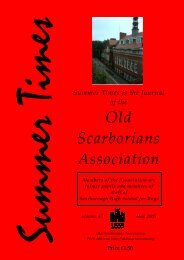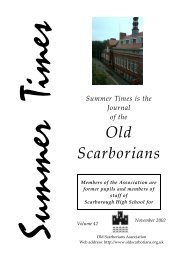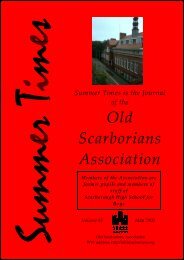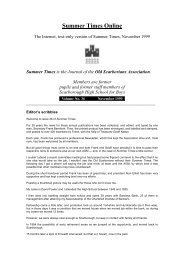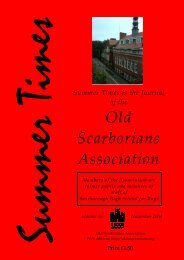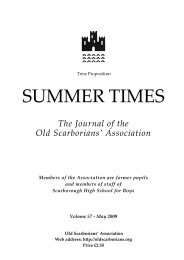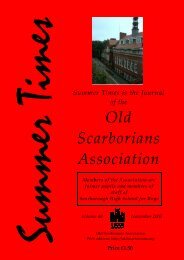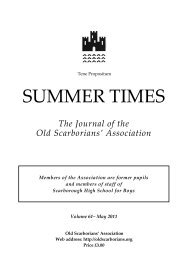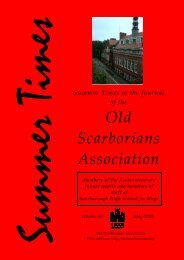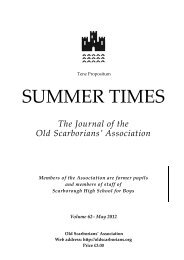Summer Times is the Journal of the Old Scarborians Association
Summer Times is the Journal of the Old Scarborians Association
Summer Times is the Journal of the Old Scarborians Association
You also want an ePaper? Increase the reach of your titles
YUMPU automatically turns print PDFs into web optimized ePapers that Google loves.
after experiencing <strong>the</strong> rigid defence <strong>of</strong> <strong>the</strong><br />
Germans on <strong>the</strong> Catania Plain, where <strong>the</strong>y<br />
seemed to take supernatural pun<strong>is</strong>hment<br />
and still were able to return scathing fire, we<br />
all expected our attack to be strongly re‐<br />
s<strong>is</strong>ted. We thought we would be sitting<br />
ducks crossing <strong>the</strong> straits in landing craft.<br />
I had now been put in charge <strong>of</strong> <strong>the</strong> mortar<br />
platoon, which had six carriers, on each <strong>of</strong><br />
which was mounted a three‐inch mortar.<br />
There was also a motorbike for <strong>the</strong> sergeant.<br />
Mortar carriers were low in priority for land‐<br />
ing – foot soldiers first, tanks and <strong>the</strong>n carri‐<br />
ers on which were mounted Bren machine<br />
guns.<br />
From <strong>the</strong> shore, we watched our troops<br />
crossing <strong>the</strong> turbulent water <strong>of</strong> <strong>the</strong> Straits <strong>of</strong><br />
Messina, waiting every second for <strong>the</strong> Ger‐<br />
man shells and machine gun fire to blow<br />
<strong>the</strong>m out <strong>of</strong> <strong>the</strong> water. But nothing happened<br />
– not one shot! Even as <strong>the</strong> craft approached<br />
<strong>the</strong> shore, we awaited some kind <strong>of</strong> trap, but<br />
again nothing happened. Then, through<br />
binoculars, I saw our troops go ashore and<br />
be embraced by Italian civilians. The Ger‐<br />
mans must have gone.<br />
I crossed in a tank landing craft, but when<br />
we hit <strong>the</strong> shore, my bloody carrier would<br />
not start. I had to leave it and commandeer<br />
<strong>the</strong> sergeant’s motorbike, so that I could try<br />
to keep in touch with our forward troops.<br />
The next few weeks were like a holiday – hot<br />
sun, blue skies, beautiful scenery, lots <strong>of</strong> vino<br />
and no superior <strong>of</strong>ficers – for I had found<br />
<strong>the</strong>re was no chance <strong>of</strong> contacting <strong>the</strong> for‐<br />
ward troops.<br />
As we advanced, <strong>the</strong> Tedesci, as <strong>the</strong> Italians<br />
called <strong>the</strong> Germans, blew <strong>the</strong> bridges. On <strong>the</strong><br />
west coast, <strong>the</strong> railway line ran just below<br />
<strong>the</strong> road, so <strong>the</strong> explosions cracked <strong>the</strong> roads<br />
on to <strong>the</strong> railway line, making both impass‐<br />
able to vehicles. Then <strong>the</strong>re were long de‐<br />
lays before <strong>the</strong> Germans could be winkled<br />
out from <strong>the</strong> hills, so <strong>the</strong>y were able to send<br />
heavy fire on anyone approaching <strong>the</strong><br />
45<br />
bridges. Th<strong>is</strong> meant that <strong>the</strong> sappers could<br />
not erect <strong>the</strong>ir Bailey bridges till <strong>the</strong>y were<br />
freed from gunfire.<br />
In a few places, I managed to manhandle my<br />
motorbike round <strong>the</strong> obstructions and, to‐<br />
ge<strong>the</strong>r with <strong>the</strong> carrier <strong>of</strong>ficer, also on a mo‐<br />
tor‐bike, we left our carriers miles below.<br />
The rich civilians who lived in magnificent<br />
houses overlooking <strong>the</strong> sea had long since<br />
sought safety elsewhere, so we broke into<br />
<strong>the</strong>ir houses, slept in <strong>the</strong>ir beds, and ba<strong>the</strong>d<br />
in <strong>the</strong> sea at least twice a day, while in <strong>the</strong><br />
d<strong>is</strong>tance we could hear <strong>the</strong> sounds <strong>of</strong> battle.<br />
Th<strong>is</strong>, unfortunately, was not to last, because<br />
when <strong>the</strong> bridges had been re‐built behind<br />
us, <strong>the</strong> mortar carriers caught us up and,<br />
soon afterwards, we rejoined <strong>the</strong> Battalion.<br />
Shortly before reaching Paolo, <strong>the</strong> direction<br />
<strong>of</strong> our attack was changed away from <strong>the</strong><br />
coast and into <strong>the</strong> Apennines. Again and<br />
again, blown bridges grounded our carriers.<br />
Never<strong>the</strong>less, on one occasion <strong>the</strong> Colonel<br />
wirelessed me to bring up <strong>the</strong> mortars to<br />
reinforce an attack. As he must have known,<br />
we could not bring up <strong>the</strong> carriers, and <strong>the</strong><br />
mortars and shells were too heavy for <strong>the</strong><br />
platoon to manhandle.<br />
I wondered how he imagined I could carry<br />
out h<strong>is</strong> order. Then someone suggested<br />
horses. I toured <strong>the</strong> nearest village on my<br />
bike, but no farmer had any horses. Then I<br />
spotted about a dozen mules in a field. The<br />
farmer was very loath to let me have <strong>the</strong>m<br />
until I wrote on a piece <strong>of</strong> paper: ‘The Brit<strong>is</strong>h<br />
Army prom<strong>is</strong>es to pay after <strong>the</strong> war <strong>the</strong><br />
equivalent <strong>of</strong> £1 sterling for <strong>the</strong> hire <strong>of</strong> each<br />
<strong>of</strong> <strong>the</strong> twelve mules’. Signed General Mont‐<br />
gomery. The ‘General Montgomery’ did <strong>the</strong><br />
trick! He would harness <strong>the</strong>m and accom‐<br />
pany us.<br />
We loaded <strong>the</strong>m up and set <strong>of</strong>f over <strong>the</strong> hills.<br />
The leading mule, led by <strong>the</strong> farmer, was <strong>the</strong><br />
only one to behave itself, and only <strong>the</strong>n<br />
when <strong>the</strong> farmer beat it about <strong>the</strong> legs. Of<br />
<strong>the</strong> rest, some rolled <strong>the</strong>ir eyes and kicked,



